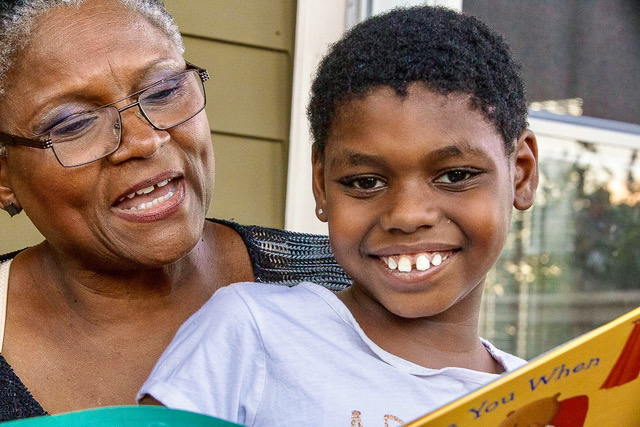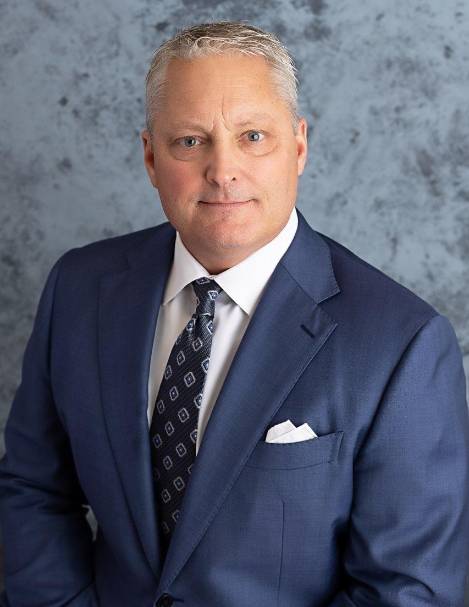Dr. Maxine Cain reads a book to her granddaughter, Makayla Cain, during a recent visit.
Photo by Dr. Eugene Cain
By Deborah M. Walker
TNCPNEWS
ATLANTA, GA – Makayla Cain is like any other fifteen-year-old teenager in many ways. The teenager enjoys surfing the internet, going to school and loves spending time with her family. She has a younger brother, Nasir, and an older sister, Amani. Makayla also enjoys watching YouTube, like most youngsters her age. She has many similarities typical to teenage life, except for one difference; she is autistic.
Makayla’s Diagnosis
At the age of three, Makayla was diagnosed with autism. Her father, Khari Cain, said there were early warning signs that something was different about her. Khari graduated from J.W. Sexton High School in Lansing and moved to Atlanta, Georgia to pursue music in 2007.
“I remember one time she was ignoring me and not being responsive when I said get out of the bathtub,” said Khari.
During this same time, Kahri said Makayla’s daycare approached him with concerns that she was not responding to the other children. Heeding the warning signs, Khari researched his daughter’s symptoms on the internet. There he learned she might be autistic. Eventually, his suspicions were confirmed. At a holistic doctor’s office, Khari and his wife, Mañana, learned of Makalya’s autism.
“My wife and I cried it out in the parking lot. Then we got in the car and asked each other about the next steps. What do we have to do? How do we get the best care for her and the best curriculum? We’ve been on that road ever since,” Khari exclaimed.
According to the Centers for Disease Control and Prevention (CDC), the developmental disability known as autism spectrum disorder (ASD) is brought on by variations in the brain. ASD is thought to have several underlying reasons that interact to alter how people typically develop. Some people with ASD have a recognized distinction, like a genetic disorder. Other factors are still unknown.
Khari said that despite Makayla’s autism, she is brilliant and talented. He said for Makayla, autism acts as a disconnect from what is going on in her head and what is happening in her body.
Because Makayla did not communicate with anyone for fourteen years, she was believed to be low functioning. However, a communication breakthrough helped shatter the beliefs that she was intellectually behind.
Makayla begins to communicate
According to her father, there were early promising signs that Makayla was cognitively advanced. If she heard a song on the radio the next day, she would find it and play it on YouTube. Khari said he could not figure out how she was doing that. He said it was an ongoing family joke that she could read.
When letter boarding was first introduced to Makayla, Khari said he was not a big fan of the communication device. Letter boarding, also known as Rapid Prompting Method, is when a teacher holds up an alphabet board or a choice of two words on scraps of paper and then verbally or physically prompts an autistic person to point to individual letters or words, according to Spectrum News.
Khari said initially, he did not like letter boarding and thought the practice was a scam. He said he believed Makayla was being guided to the correct answer after being read a long story. After a few sessions, he decided not to pursue letter boarding further.
“In the autism community, we feel like we get taken advantage of because we’re trying so desperately to find help for our kids that we are trying different things. We’re often overcharged,” said Khari.
When an au pair, arrived to stay with the Cain family, letter boarding was once more suggested. Andy, the au pair, is South African and had prior training with autistic kids but no letter boarding experience. An au pair is a young person who resides with a local host family in exchange for housing and pocket money and learns their language and culture. Andy and Makayla worked together and this time letter boarding was more successful.
“My wife and I saw it first hand. We were blown away even then; it was still very structured. They would read a passage, and she would answer,” said Khari.

A page of the book “When Makayla Smiles” featuring Makayla Cain and her mother, Mañana Cain.
Illustration by Chermel Bluitt

Makayla Cain and her mother, Mañana Cain.
Photo by Dr. Eugene Cain
Last March, Khari hired a therapist, an applied behavior analyst, that specializes in autism, who made home visits to work with Makayla on letter boarding. During the sessions, Khari said he would walk into the room, and Makayla would flash him a bright smile and say, “Hi, Dad.” That was the first time she communicated with him.
Now able to express herself, Makayla has shared her thoughts and feelings through letter boarding. On one occasion, she was asked by her letter boarding specialist how she was doing, and Makayla replied, “I am upset today,” because she was frustrated that she did not wish her father a happy Father’s Day.
Through more extensive testing, Khari learned his daughter is in the 90th percentile in many areas of learning, such as math and reading. Currently, she is considered an eighth-grade student at her private school. Khari has plans for Makayla to attend college after high school.
At her request, Makayla’s schedule has calmed down. She communicated, through letter boarding, that she was tired and wanted to relax. Currently, she has letter boarding three times a week.
Now correctly medicated and on the right path with letter boarding, Khari said Makayla is now peaceful and calm. Khari said there were times when she was hyperactive and had issues sleeping. That is no longer the case; she still has energy but is not overactive.
“When Makayla Smiles”

To help raise autism awareness and shed light on Makayla’s story, her grandmother, Dr. Maxine Cain, wrote a book about Makayla’s experiences titled “When Makayla Smiles.”
“Twelve years have passed since I first wrote the first draft of the book, which was dormant, lost in the files of a computer. Unable to locate the original text, I rewrote it, and of course, the text is completely different, and so is our Makayla,” said Dr. Cain.
There are many passages in the book that Dr. Cain enjoys. Some passages demonstrate Makayla’s personality and favorite hobbies, such as spending time with family. Dr. Cain’s favorite passage in the book is about Makayla’s favorite dessert.
“When Makayla smiles, her smile makes you want to eat your favorite dessert: chocolate, strawberry, and vanilla ice cream bordered by a split banana covered with crushed pineapple, pecans, topped with dark chocolate syrup, whipped cream, and ranchero cherries!” exclaimed Dr. Cain.
The illustrations were drawn by Lansing native Chermel Bluitt, who was inspired by family photos of Makayla, explained Dr. Cain. Bluitt is the author of five children’s books and is a long-time friend of Dr. Cain. She now resides in Mississippi.
With an extensive background in writing and education, Dr. Cain said she started teaching in the Detroit Schools in 1968 and taught all grades. In 2011, she retired from Detroit schools and decided to return to Lansing and resume her education career. Dr. Cain became the principal of Sankofa Shule charter school, which was one of two African-centered schools in the city.
Dr. Cain said that providing a quality education for children should be a top priority for all educators. Every child deserves an excellent teacher in front of them in the classroom. Parents also need to stay proactive and involved in their children’s education. Students should also value their education more than many now do. Everybody needs to step their game up, she added.
While preschool is essential, quality care and education must be started in the womb. Dr. Cain said the brain is developed while the mother is pregnant. She now advocates for a reciprocal partnership between hospitals and schools.
“Parents need to know about the importance of talking to their children and reading to them in the womb; playing classical music and other genres of music while the child is growing in the womb is important,” said Dr. Cain.
A Detroit Association of Black Storytellers member, Dr. Cain, portrays Harriett Tubman and Fannie Lou Hamer. As a storyteller, she shares the importance of literature and the spoken word. She stated that a storyteller is a person who uses personal expressions to share thoughts and feelings about the lessons. It could be something that deals with morals and character development.
For African Americans, initially, history was told instead of read. This was especially true of stories of African themes. Dr. Cain said African Americans learned much through cerebral expressions and oral history.
Makayla Moving Autism Foundation

Khari Cain is a Grammy award-winning producer who is professionally known as “Needlez,” known for working with top musicians such as Bruno Mars and Cardi B. His mother, Dr. Cain said his success in the music industry helps fund Makayla’s care.
Photo by Dr. Eugene Cain
April 2nd was International Autism Awareness Day. To celebrate, Khari and his wife Mañana held a “Light it up Blue” special event at Bridge Boutique (www.bridgeboutique.com), which Khari and Mañana own. A food truck, clowns, bowling, live entertainment, and much more were offered at the event to help people become more aware of autism, said Khari. Makayla was present at the event.
Ben & Jerry’s, located next door to the boutique, donated three large banana splits in honor of Makayla’s favorite dessert. The treats were auctioned off in a raffle.
To help with their cause, Khari and Mañana established a foundation for Makayla called Makayla Moving Autism, Inc. The foundation was established as a movement to support people in the BIPOC community on the autism spectrum—all proceeds from “When Makayla Smiles” will go to the Makayla Moving Autism Foundation.
Khari said it is essential to undergo genetic testing to determine the exact type of autism a person may have. Makayla has undergone genetic testing, and it was concluded that she has Phelan-McDermid syndrome, which is the loss of a small piece of chromosome 22. According to Cleveland Clinic, it is a rare genetic disorder that can cause medical, intellectual, and behavioral concerns. Symptoms often appear early in life and range from mild to severe. They include muscle weakness, seizures, speech and developmental delays, autism spectrum disorder, and certain physical features.
Khari is a Grammy award-winning producer who is professionally known as “Needlez,” known for working with top musicians such as Bruno Mars and Cardi B. Dr. Cain said his success in the music industry helps fund Makayla’s care. She said not all parents have the resources that Khari has. That is the reason for the foundation and building.
Getting the proper services is essential. There are many services locally and nationally, such as the Hope Network. Schools are also great places to find and receive assistance.
“Every school district has a responsibility to educate and help these kids. Once you have the knowledge and know-how, it works. And find the right IEP that helps. No one can fight for their children more than parents,” explained Khari.
According to Understood, an Individualized Education Program is referred to as IEP. IEPs are a part of public education from PreK to 12. A student’s special education curriculum supports and services must be outlined in an IEP for them to succeed in school.
Khari said that caring for an autistic child is a marathon, not a race, and parents must understand that there is no quick fix. There will be difficult moments, but the best way to deal with stressful situations is to take a deep breath and relax.
To find out more about autism and about Makayla, the foundation, or Dr. Cain’s book, visit makaylamovingautism.com. There is also a fundraiser to purchase a mobile unit that will make spreading the word about autism easier to reach BIPOC communities at www.gofundme.com/f/makayla-moving-autism.



